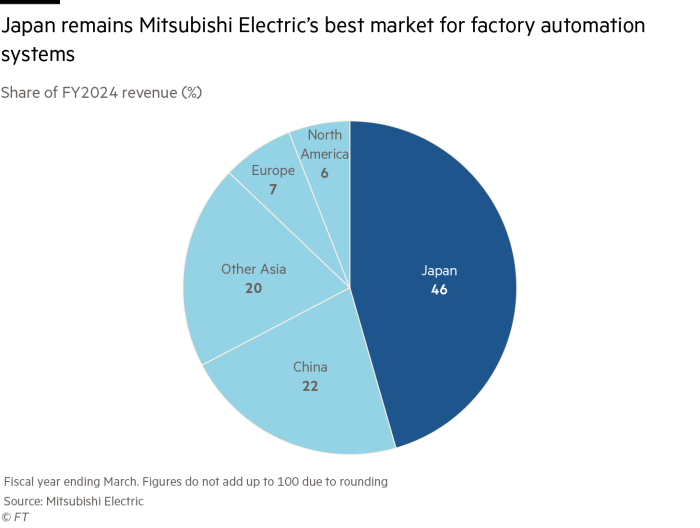
Hi everyone, this is Cheng Ting-Fang, your #techAsia host for this week.
My recent holiday to Florence, Italy, to explore the birthplace of the Renaissance and the city’s renowned museums was a delightful escape. After a leisurely stroll up a hill to Piazzale Michelangelo, I was rewarded with a breathtaking sunset and a lively concert. And to truly unwind from the tech industry’s frenetic pace, I also immersed myself in several Korean dramas while away.
But upon returning to work this week, I quickly found myself back in the semiconductor world. A visit to ASML’s massive chipmaking tool refurbishment centre in the Taiwanese city of Taoyuan spurred me to think about the most pressing issue commonly faced by the tech industry: how to aggressively cut its carbon footprint.
One crucial aspect of that reduction is minimising waste through reuse and recycling. In the ASML cleanroom I visited, engineers are reworking the company’s PAS 5500 series lithography machines — the European top chip tool maker’s most long-lasting model that was first introduced more than 30 years ago.
Even though they can’t be used to produce the most cutting-edge AI processors, these machines are still useful for making various sensors, accelerometers and ultra-low-power chips. Since the centre started operation, it has brought back retired equipment from chip plants globally, torn them down, separated their parts, and repaired and reassembled over 130 sets of machines to put them into use again.
The team has even developed and redesigned parts that are no longer available from suppliers, fixing nearly every component of existing machines. The reuse rate of total defective parts has reached 88 per cent. Here, the company has expanded from a small team of engineers to a staff of over a 100.
The circular economy has evolved from a theoretical concept to a prominent topic in the tech industry, driven by global leaders such as Apple, Google, TSMC and ASML. But another crucial element in reducing carbon emissions is access to renewable energy, which ASML and many other chip and tech companies have found to be a significant challenge in Asia.
After years of challenges, ASML finally secured some renewable energy sources in Taiwan. The company is also actively exploring green energy options in South Korea, where it has a significant presence but limited renewable resources. Notably, ASML already sources 100 per cent of its energy from renewable sources in the US, Europe and China.
ASML CEO Christophe Fouquet told me the prospects for green energy in Taiwan and South Korea have improved significantly and become less worrying compared to two years ago. “When it comes to [the semiconductor] industry, sustainability is going to be key [for future competitiveness],” the CEO said.
Lora Ho, TSMC’s senior vice-president and chair of its ESG committee, echoed this sentiment, saying that in the past, ESG (environmental, social and governance) efforts were something a company would pursue when time and resources allowed. But today, ESG is a critical imperative for maintaining competitiveness. “For younger generations, such as Generation Z, whether a company has ESG commitment is a key factor in their decision to work there,” Ho said.
Sustainability: Color it gold
Doris Hsu, chair and CEO of GlobalWafers, the world’s third-largest wafer maker, considered sustainability and access to renewable energy as the critical factors when her company decided where to expand manufacturing activities, according to an exclusive interview with Cheng Ting-Fang and Lauly Li of Nikkei Asia.
“For instance, we could have built our Texas plant in South Korea or in Taiwan, but the biggest difference is that access to green energy is insufficient in most of Asia,” she said. She added that the wafer materials produced using green energy will be more competitive and preferred by customers than those built by fossil-fuel sources of energy.
Hsu is nicknamed the “wafer queen” and her company is expanding in multiple countries, including the US, Italy, Japan and South Korea, in addition to its home base of Taiwan, to build a more diverse production footprint. It is also considering enlarging its capacity in Malaysia.
Despite a tepid macroeconomic outlook for 2024, Hsu expects double-digit percentage growth in the wafer materials market in 2025 and continued growth in 2026. That growth will be driven by rebounds and increases in applications for the electronics market.
Son’s OpenAI bet
SoftBank’s Masayoshi Son is making good on his pledge “to go on the counteroffensive” by investing $500mn into OpenAI, as part of a massive fundraising effort that will value the artificial intelligence start-up at $150bn, George Hammond in San Francisco writes for the Financial Times.
Son has retrenched his fund over the past two years, pulling back after a free-spending period in which SoftBank ploughed tens of billions into various start-ups. Some of those, such as co-working business WeWork, would later fail spectacularly.
But growing excitement about AI over the last two years, sparked by OpenAI’s launch of ChatGPT in November 2022, has drawn Son back from the sidelines. The group is already the majority owner of UK chip designer Arm, and SoftBank now plans to invest in OpenAI via its Vision Fund, a large vehicle for backing start-ups which is mainly made up of Son’s personal wealth, according to two people with knowledge of the deal.
The Japanese group is joining one of the most hyped funding rounds of the year, which amounts to a bet that OpenAI can continue the frantic pace of growth that has seen its revenues rise to almost $4bn. Some investors in the company believe it can ultimately be worth $1tn or more.
Automation ka-ching

A shortage of technicians and skilled workers is a common challenge facing many major economies, from Japan and South Korea to the US. One potential solution is to increase investment in automation, allowing machines and robots to assist with manufacturing tasks.
Nikkei Asia’s Mitsuru Obe visited Mitsubishi Electric’s largest factory, in Nagoya, where the company builds industrial robots and precision machines. One flagship machine can drill 6,000 holes per second at varying depths into multilayer materials, a critical tool for making print circuit boards for AI computing.
Mitsubishi Electric said that its automation division is significantly more profitable than its other businesses, with promising revenue growth prospects. While Japan remains its top market, the company sees emerging opportunities in other Asian economies as multiple nations in the region compete to become the next crucial manufacturing hub. The low penetration of factory automation systems currently in these regions presents significant growth potential.
Meta’s Vietnam vision
Vietnam has emerged as an electronics production hub and recently secured another victory.
Facebook parent Meta announced it will make its latest virtual reality headset, the Quest 3S, in the south-east Asian nation in 2025, a move that the US social networking giant hopes will spur growth in a key market with 75mn users, its seventh-biggest globally, Lien Hoang of Nikkei Asia writes.
Facebook also plans to introduce additional AI services in Vietnam, such as a Vietnamese-language Meta AI virtual assistant and Business AI for Messenger in the coming months.
However, as Vietnam is a one-party state, Facebook faces challenges in maintaining free speech and must collaborate with Vietnamese authorities to combat information deemed by the state to be harmful, toxic or false.
Suggested reads
-
Malaysia secures $6.5bn from Oracle for cloud infrastructure (Nikkei Asia)
-
Connected cars pose real risks (FT)
-
Singapore’s Changi Airport embraces biometric immigration screening (Nikkei Asia)
-
Chinese outbound investment surges to record on clean energy ‘tsunami’ (FT)
-
Kakao Mobility fined $55mn for alleged market abuses (Nikkei Asia)
-
AI is fuelling an Asia grid investment boom (FT)
-
China to roll out cyber security rules covering generative AI (Nikkei Asia)
-
Dating apps search for users who want to be ‘just friends’ (FT)
-
Japan’s Shimano gives cyclists an easier ride with AI gear shifter (Nikkei Asia)
-
Thailand’s Robinhood food delivery app lives on after sale to consortium (Nikkei Asia)